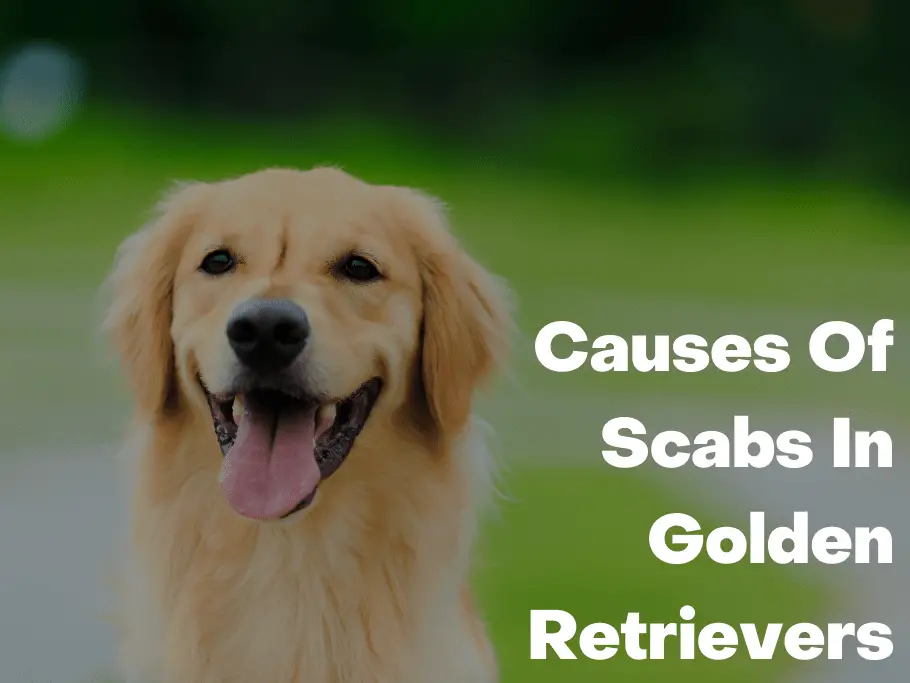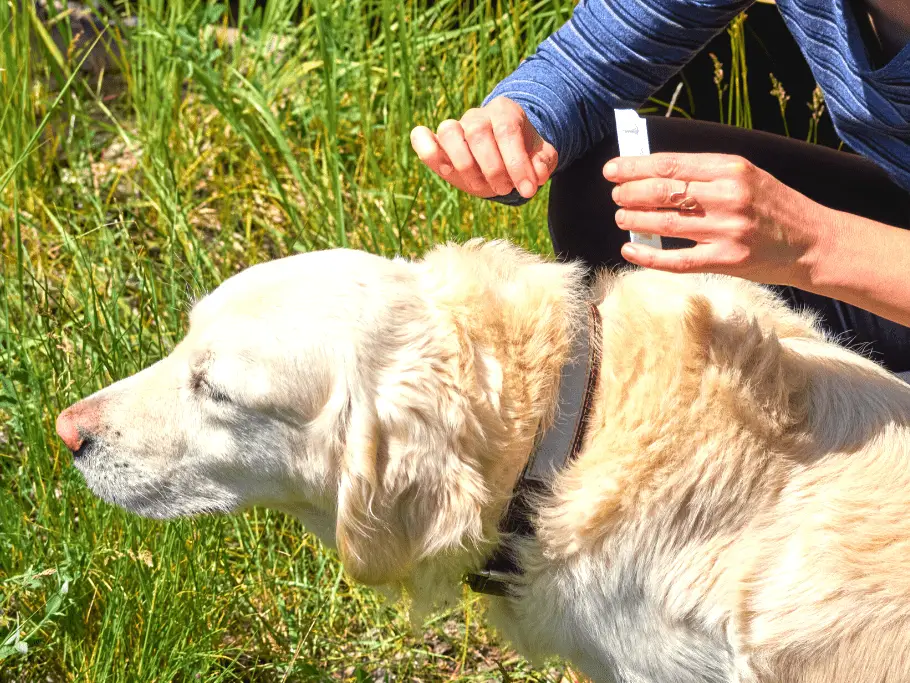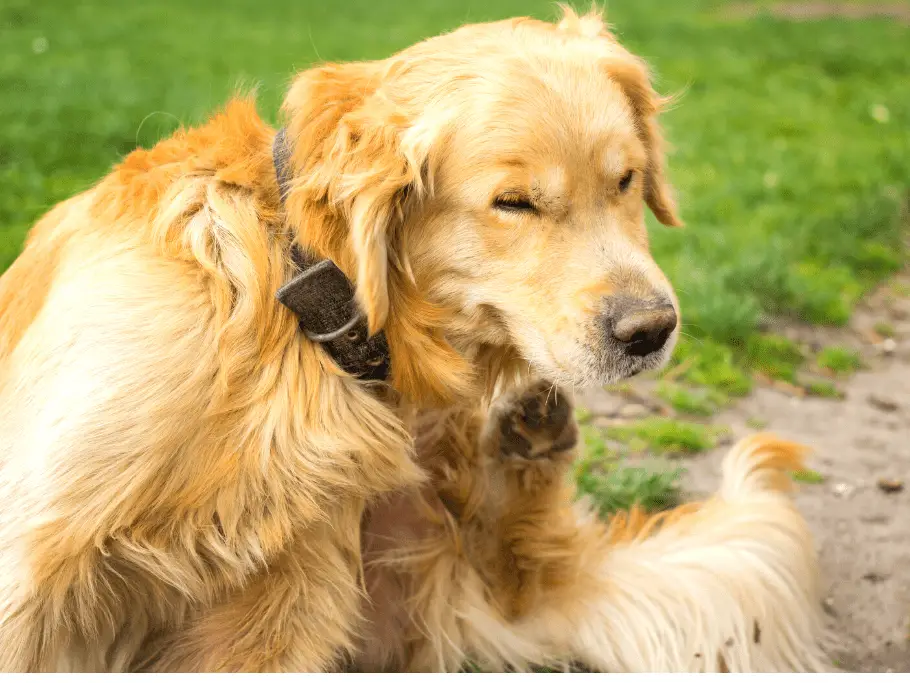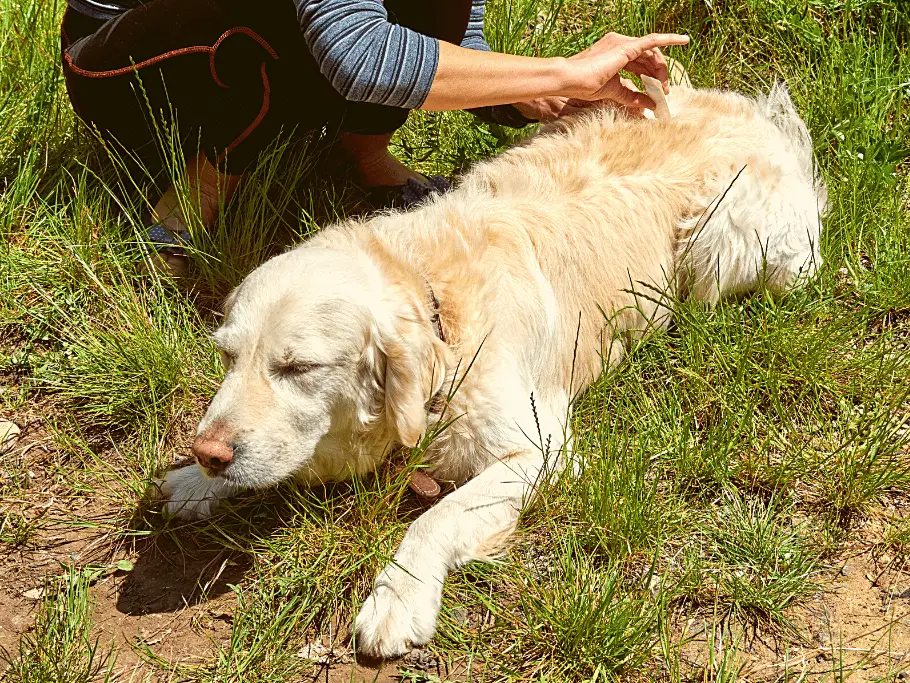It can drive you mad when your Golden Retriever has an itch; it just can’t leave alone – you hear that scratching sound, and you know it’s worrying at that sore bit again.
So when your poor pup comes out in red patches, sores, and crusty scabs, you want to know the reason why so you can relieve it of any pain and discomfort, help its skin heal, and enable it to get on with living its best life.
Table of Contents
Why Does My Golden Retriever Have Scabs?
There are many different reasons why your Golden Retriever has developed scabs. Skin conditions are on the increase with a wide range of causes. Your Golden Retriever may have scabs if it is sensitive to flea bites, has a food intolerance, or allergy to something in the environment. If they react to something, your dog will lick the affected area, making it sore.
Causes Of Scabs In Golden Retrievers

Allergies
Having an Allergy is one of the most common reasons for inflammation of your Golden Retriever’s skin, and they can be triggered by numerous things in the environment or on your dog’s diet.
When a human has an allergy, it is often the respiratory system affected, causing them to sneeze, cough, or wheeze, but it’s their skin that’s usually affected for dogs.
Allergies are caused by your dog’s immune system responding to something it encounters by overreacting and producing a protein that triggers the release of histamines that cause irritation and inflammation. A Golden Retriever who is allergic to something will show it through skin problems and itching.
Environmental Allergies
Dogs are commonly affected by the same types of things as humans – such as dust, pollen, certain foods, mold, chemicals, or fabrics. However, the most common allergies are seasonal – at least at first.
Some allergies, if left untreated, can worsen if you don’t get to the root of the problem.
To help diagnose the issue, it is essential to look at the context – e.g., the time of year or what the dog was doing before the reaction. These give clues to what the culprit may be. For example, if the allergy occurs year-round, it may be mold or dust. On the other hand, seasonal allergies may indicate pollen sensitivity.
Food Allergies
A food allergy is more likely to affect a dog’s skin and cause itching leading to sores that will scab over. Typical culprits include certain meats, grains, preservatives, colorings, and dairy products.
To identify the offending food, your vet might recommend an elimination diet that involves removing the suspected allergenic food from your dog’s diet for 8-12 weeks and monitoring its reaction to seeing If the problem persists. You can have a look at the list of best dog food for Golden Retrievers with skin allergies.
Flea Allergy
When a flea bites your dog, its saliva enters your dog’s body, triggering an allergic reaction in those sensitive to it. This is an extremely common ailment for dogs and affects all breeds.
Flea Allergy Dermatitis is typically seasonal – worse in the peak time for fleas (summer and autumn) and in warmer climates where fleas are prevalent.

Many different flea treatments are available, including collars and topical applications that use pesticides to kill fleas, larvae, and eggs. Many of these products offer preventative protection, so if your Golden Retriever is allergic to fleas, it’s best to find something to stop an infestation before it occurs.
Symptoms
- Itchy skin
- Chewing on paws
- Rubbing the face on the carpet
- Scratching or biting parts of the body
- Itchy ears, head shaking
- Hair loss
- Sore or discolored patches of skin or hot spots
Pyoderma
Pyoderma is a bacterial skin infection. Fortunately, it is not contagious. Early signs are itchy red pus-filled spots, similar to pimples in humans. Then, they can develop into red, ulcerated sores with dry, crusty patches.
There are various causes, including broken skin, skin bacteria imbalance, or impaired blood flow. In addition, it can be a sign of underlying health conditions or impaired immunity.
Pyoderma is often secondary to allergic dermatitis, developing in the sores left from scratching. The risk of infection is increased when your dog has a fungal infection, disease of the hormonal glands, or allergies.
Symptoms
- Itchy, red spots filled with yellow pus
- Red, ulcerated skin
- Dry crusty patches
- Hair loss
- Licking of the infected area
External Parasites
Demodectic mange, also known as Demodex, red mange, follicular mange, or puppy mange. It is caused by microscopic mites that live in the hair follicles of virtually every dog. They usually live there without doing any harm.
It generally affects dogs with inadequate or poorly developed immune systems like the very young, old, or those with underlying health concerns.
Mothers pass the mites onto their puppies within the first few weeks of life through direct contact. Most are immune to the mites’ effects, but those who are not immune will develop mange.
Symptoms
- Bald patches
- Crusty, red skin which sometimes appears greasy or wet
- Hair loss on the head, including around the muzzle and eyes
- Inflamed, oozing patches
- Secondary bacterial infection
- Fever
- Lethargy
Sarcoptic Mange, also known as scabies, can be more challenging to diagnose as it is often mistaken for inhalant allergies. It is far worse than Demodex and highly contagious. It can infect other animals such as cats, foxes, and even humans. Fortunately, there are several effective treatments to control the disease quickly.
Symptoms
- Intense scratching
- Skin rash
- Crusty scabs
- Hair loss
Excessive Scratching
There are various reasons your Golden Retriever may scratch themselves excessively. First, it can be stressful for you, the owner, to witness your Golden Retriever constantly scratch at their skin. Second, you know it’s not their fault, but the scratching can cause harm over time as the skin becomes inflamed and sore and more open to infection.

Causes can be allergic reactions to food or substances in the environment they have inhaled or come into contact with, fungal or bacterial infections, or parasites.
Symptoms
- Scratching affected areas
- Biting or licking the sore skin
- Head shaking
- Rubbing themselves along the carpet.
Fungal Infections
Ringworm is a disease caused by a fungal infection, not as its name might suggest a worm. However, it is highly contagious, and signs include bald patches with a roughly circular shape – usually around the head and legs.
They are commonly seen in puppies and young dogs with underdeveloped immune systems. However, most healthy dogs have some resistance.
Spores transmit ringworm in the environment, which can be transmitted from the soil and by an infected animal’s bedding, the carpet, brushes, or other grooming tools. It is relatively easy to treat with fungicidal shampoos or medication from your vet.
Symptoms
- Signs are bald patches with a roughly circular shape
- The rash can be dry, scaly, swollen, or itchy
Treating Scabs In Golden Retrievers

- Treat the underlying cause for the scabs, and you will usually find the scabs soon disappear.
- Demodectic mange can be treated with topical creams. In most cases, the problem resolves itself as the puppy grows.
- Sarcoptic mange can be treated with various topical applications, including Frontline – consult with your vet to find the best medication.
- Suppose your Golden Retriever suffers from a reaction to flea bites. In that case, it’s best to tackle the infestation as thoroughly as possible, which includes treating not only your dog but also your yard and your home – deep cleaning carpets, bedding, and spraying with anti-flea products.
- Ringworm is relatively easy to treat with antifungal medication.
- Bacterial infection like Pyoderma usually responds well to medical treatment. Consult your vet.
- To help heal scabs, you can also gently bathe the infected area, dry with a soft towel, and moisturize with coconut oil until the skin is healed.
What Can A Golden Retriever With Scabs Attempt To Do?
Once your Golden Retriever gets a sore bit that scabs over, it might not be able to leave well alone to let the skin heal.
Your Golden Retriever may find it irresistible to:
- Scratch affected areas.
- Bite or lick the scab making the skin sore again.
- Shake its head (in the case of an ear infection).
- Rub itself along the carpet.
Preventing Scabs In Golden Retrievers
- Groom and bathe your Golden Retriever regularly to stop dirt from building up and irritating its skin.
- Make it part of your routine to regularly check for fleas. You might also want to use a flea collar or other flea prevention treatment.
- Ensure they have a healthy, balanced diet based on recommendations from your vet. A healthy dog with a strong immune system has greater protection from allergies, infections, and parasites.
- Supplement their diet with fish oil. The Omega 3 helps to keep skin and fur in tip-top condition.
- After bathing, apply a soothing moisturizer or skin balm to keep the skin supple.
- Keep your Golden Retriever away from areas where foxes and other wild animals like to hang out as this helps reduce the chance of picking up Sarcoptic mange.
FAQ
Why Does My Golden Retriever Scratch So Much?
Golden Retrievers scratch their skin because it is itchy. The itch can be caused by a reaction to a flea bite, food sensitivity, allergy (to pollen, dust, or anything else in their environment), or infection caused by a parasite, bacteria, or fungus.
Why Does My Golden Retriever Get Random Scabs?
There will always be an underlying cause of scabs in Golden Retrievers, but some are more difficult to identify than others. The scabs might seem random if you haven’t noticed your dog scratching itself. Start paying more attention to your dog. See if it scratches or licks its skin and when that occurs, try to find out why.
What Can I Give My Golden Retriever To Stop Itching?
Because it is best to treat the underlying cause, you need to consult your vet in the first instance if your dog can’t stop itching. A vet can determine whether it’s allergies, parasites, or a flea bite and can give you the best course of treatment.
Can Fleas Leave Scabs On Golden Retrievers?
Yes, a flea bite might leave your dog unbearably itchy so that they lick and scratch the bite until it becomes red, sore, and inflamed. This sore will scab over.
Can I Give My Golden Retriever Benadryl To Stop Itching?
Dogs can use vet-approved Benadryl to stop itching. Benadryl or diphenhydramine is an antihistamine used to treat the symptoms of allergies in humans and animals. The best thing to do is consult your vet before administering any drug to your dog.
Conclusion
When your Golden Retriever has scabs, you want to take the best course of action to ensure that they heal properly. However, you also need to discover the underlying cause of the problem and understand that there can be various reasons why your Golden Retriever has scabs.
Identifying the cause, seeking the appropriate treatment for your dog, and taking care of their dietary, grooming, and healthcare needs can help reduce the possibility of your dog suffering from a skin condition and help you manage any ailments your dog may have so that they can live a happier life, free from annoying itches.


